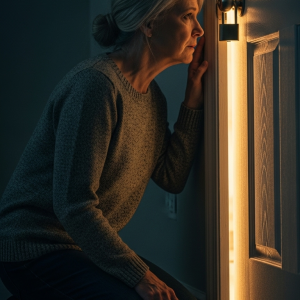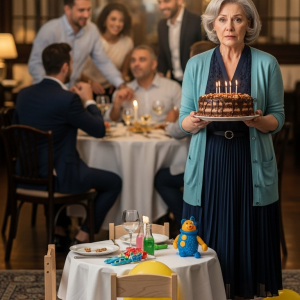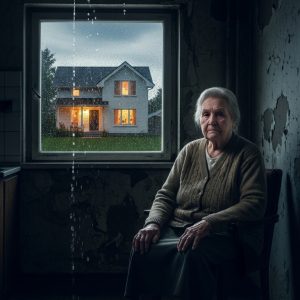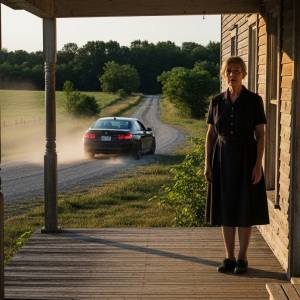The cardboard beneath my back had grown soft from three months of body heat and the occasional leak from the Honda’s sunroof. I watched my breath fog the car window in small, perfect circles. Outside, a street light cast long shadows across the empty parking lot of a defunct grocery store—the place I’d been sleeping since October.
My daughter Jane’s voice echoed in my head from our last call. “Just sleep in your car a little longer, Mom. I’m busy with the baby coming. You understand, right?”
I understood more than she knew. The flood had taken everything: my little house, my photographs, my mother’s china. At sixty-two, I found myself with nothing but a twelve-year-old Honda Civic. Jane’s offer to let me stay with them had been temporary, and “temporary” quickly became impossible when her husband, Frank, started leaving passive-aggressive notes about utility bills taped to the refrigerator.
The morning I left, Jane barely looked up from feeding my granddaughter, Emma. “That’s probably for the best,” she’d said. “Frank’s been stressed.” I knew what that meant. He got mean. He got comfortable treating me like an unwelcome guest.
My phone buzzed. A text from Jane. Hope you’re doing okay. Frank got the promotion! We’re looking at bigger houses now. Baby #2 due in spring!
I stared at the message until the screen went dark. She hoped I was doing okay while I slept in a car in December, while she was celebrating promotions and expanding her family. A small, hard seed of anger began to grow in my chest.
Each morning, I drove to the public library. I’d spend hours at the computer terminals applying for jobs and rebuilding what the flood had destroyed. It was there, on a Tuesday, that I saw the email that would change everything.
Dear Louise Qualls, it began. The sender was Harrison Blackwell and Associates, estate attorneys.
My heart hammered as I read on. We represent the estate of your late aunt, Tilly Brendle. We have been attempting to locate you regarding a bequest in her will. Please contact our office at your earliest convenience.
I sat frozen in the hard plastic chair. Aunt Tilly, my mother’s sister, who had moved to California in the 1980s and faded from our lives. She had remembered me.
The lawyer’s voice on the phone was professional, almost bored, as he recited numbers that made my hands shake. “The property in Pasadena is worth approximately $850,000,” he said. “The liquid assets total another $320,000. You’re looking at inheriting well over a million dollars, Ms. Qualls.”
I ended the call in stunned silence. The homeless woman in the corner of the library had just inherited a fortune.
I drove to a motel and paid for three nights in cash. I took the longest, hottest shower of my life and looked in the mirror at a woman I barely recognized—thinner, with hollow cheeks and eyes that had learned to expect disappointment. But for the first time in months, I saw a spark of possibility.
My phone buzzed. Another text from Jane. Haven’t heard from you in a few days. Everything okay?
I’m fine, I finally typed back. Just figuring some things out.
The California sun felt like forgiveness on my face. A car service took me to the house on Craftsman Avenue, a 1920s bungalow with a wraparound porch and ancient oak trees. It had the solid bones of a home built to last.
The attorney, Robert Rice, met me at the gate, looking surprised when I climbed out of the car. “Ms. Qualls,” he said, “Your aunt spoke of you often. She made it sound like you were quite successful.”
“People change. Circumstances change,” I said.
Inside, the house told the story of a woman who had lived alone, but not lonely. It was filled with books, plants, and carefully chosen antiques. On the dresser, I found photos of Tilly, always smiling. In many of them, she was with a tall, silver-haired woman.
“Was my aunt married?” I asked.
Mr. Rice cleared his throat. “She shared her life with someone. Patricia Meek. They were together for thirty-seven years.”
I picked up a photo of the two women, their hands intertwined. The love between them was palpable. I understood then why Tilly had chosen me. We had both learned that family isn’t always about blood.
That evening, I stood on my new front porch and called Jane.
“Mom, finally! I was worried. Where are you?”
“California,” I said simply. “I inherited a house.”
There was a silence. Then, “What do you mean, inherited? Aunt Tilly? How much money?”
There it was. Not, I’m so sorry for your loss, or how wonderful that you have a home again. Just, how much money?
“Enough,” I said.
“Well, that’s fantastic news! Frank and I were just talking about how we could help you get back on your feet. This solves everything. When are you coming home?”
“I’m not sure I am coming home, Jane.”
“What do you mean? Your life is here! Emma misses her grandmother! And with the new baby coming…”
“You seemed to manage just fine with me sleeping in my car for three months.”
“Mom, that’s not fair! We’re family. This inheritance is wonderful, but you don’t need to run away. We can help you find a nice place here, close to us.”
Close enough to be convenient when they needed a babysitter. Distant enough not to be a burden.
“I’ll call you in a few days,” I said, and hung up.
Three weeks in California changed me. I started my mornings with coffee on the porch, getting to know my kind neighbors. The house itself was becoming mine, one small choice at a time. Then, Jane called.
“Mom, thank God. I’ve been worried sick.”
“I’m fine, Jane. Just settling in.”
“Settling in? Frank and I have been talking, and we think you should come home immediately. This whole California thing is just escapism.”
“What reality am I avoiding, exactly?”
“You can’t just play house in some dead woman’s home! You have responsibilities here. Family.”
“I had no family when I was sleeping in my car.”
“Oh, don’t be so dramatic! That was temporary. Now you’re not homeless. Problem solved. So sell the house, take the money, and come home where you belong.”
Her words were like a slap. “I like it here,” I said simply.
A long silence. Then, “Fine. But Frank got the promotion. We’re looking at houses. Real houses. We’re actually flying out there next weekend to see you. Help you get your head on straight.”
Help me get my head on straight. As if moving from homelessness to homeownership was a sign of confusion.
“I’ll pick you up at the airport,” I heard myself say.
The old me would have been grateful. She would have spent the week cleaning and shopping to make them feel welcome. But the old me had slept in a car for three months while her daughter planned nursery renovations. The old me was gone.
Dinner at Pasadena’s finest restaurant was Frank’s idea. They performed a careful choreography of success, talking about promotions and their dream house.
“The house we’re looking at is really an investment,” Frank explained. “The only problem is it’s a bit of a stretch financially. We’re thinking about asking family for help with the down payment.”
There it was. The real reason for their visit.
“Well,” Jane said carefully, “we were hoping for maybe fifty thousand. Sixty at the most. We’d pay you back, of course.”
Sixty thousand dollars. Money they assumed I had, and they had a right to. “That’s a significant amount,” I said.
“But you have it,” Frank stated, as if that settled it. “And it’s family. This is what family does.”
I changed the subject, asking about Emma. For a moment, Jane softened, her love for her daughter genuine. “Then come home,” she said immediately. “Emma needs her grandmother. This new baby will need you.”
“When I was sleeping in my car, neither of you seemed to think Emma needed her grandmother very badly.”
Frank’s jaw tightened. “That’s not fair. You were going through a difficult time. Sometimes people in crisis need professional help.”
Professional help. As if my homelessness had been a mental health crisis, not the result of having nowhere else to go. “I wasn’t having a breakdown, Frank. I was having a housing crisis.”
“And now you’re not,” Jane said brightly. “So, let’s move forward.”
I excused myself. In the restroom mirror, I saw the woman I was becoming. I thought about Tilly and Patricia, and the new locks on my doors, the keys that belonged only to me. When I returned to the table, they were looking at photos of the house they wanted to buy.
The next morning, they arrived at my house. I opened the door before they could knock, stepping onto the porch instead of inviting them in.
“Actually,” I said, gesturing to the wicker chairs, “I think the porch is perfect for our conversation.”
Frank opened his briefcase. “Louise, we want to make sure you’re thinking about the big picture. This house is way too big for one person. The maintenance, the taxes… you could sell this place, buy something smaller in Ohio, and still have hundreds of thousands left over to help your family build wealth.”
“Help my family build wealth,” I repeated slowly.
“Exactly,” Jane said eagerly. “It’s about creating generational wealth.”
“We think you should invest in your grandchildren’s future,” Frank said smoothly, “instead of rattling around in some dead woman’s house, playing make-believe about starting over at sixty-two.”
The silence that followed was absolute.
“You know what’s interesting?” I said conversationally. “Three months ago, I would have agreed with you. I would have sold this house, moved back, and handed you whatever money you asked for. I would have been grateful.”
“Mom…” Jane started.
“But then I learned something,” I said, holding up a hand. “I learned the difference between being loved and being useful.”
I stood up. “Jane, I love you. I love Emma, and I will love the new baby. But I will not subsidize your life while you treat mine as disposable.”
“We want you to be part of our lives!” Jane protested.
“No,” I said. “This conversation is about you wanting my money. If you wanted me in your lives, you wouldn’t have let me sleep in my car for three months while you shopped for bigger houses.”
Frank snorted. “Here we go again with the car thing.”
“You didn’t throw me out,” I conceded. “You just made it clear I wasn’t welcome.”
“This is ridiculous,” Frank fumed. “You’re throwing away your family over money.”
“I’m not throwing away anything,” I said. “I’m refusing to purchase love that should be freely given.”
I stood on the porch and watched them drive away. Jane looked back once, but Frank stared straight ahead. After they left, I sat in Tilly’s chair and pulled out my phone. I didn’t return the seventeen missed calls from them. Instead, I called my attorney.
“Mr. Rice,” I said. “I have a question about making changes to my will.”
“Of course,” he replied. “What kind of changes?”
“I want to establish a scholarship fund,” I said, “for women over fifty who are starting over after losing everything. And I want to leave this house to someone who will appreciate what Tilly and Patricia built here.”
“Do you have a beneficiary in mind?”
I looked over at my neighbor Sharon’s house. “Yes,” I said. “I think I do.”
That evening, I called the book club and asked about joining. The woman on the phone seemed delighted. “We’re reading Late Bloomers next month,” she said. “Stories about women who found their power later in life. You’ll fit right in.”
As the sun set, I sat on my porch, reading. The phone was silent. The silence felt like freedom. The woman who’d slept in a car for three months was gone. In her place was someone who understood that dignity, once reclaimed, was worth more than any family’s approval. The doors were locked. The will was changed. And I was finally, completely home.




